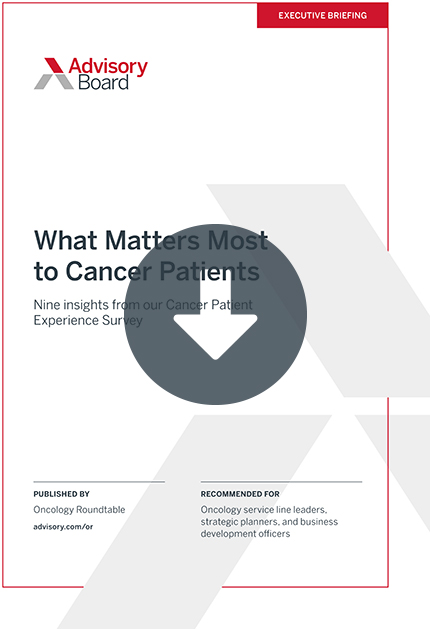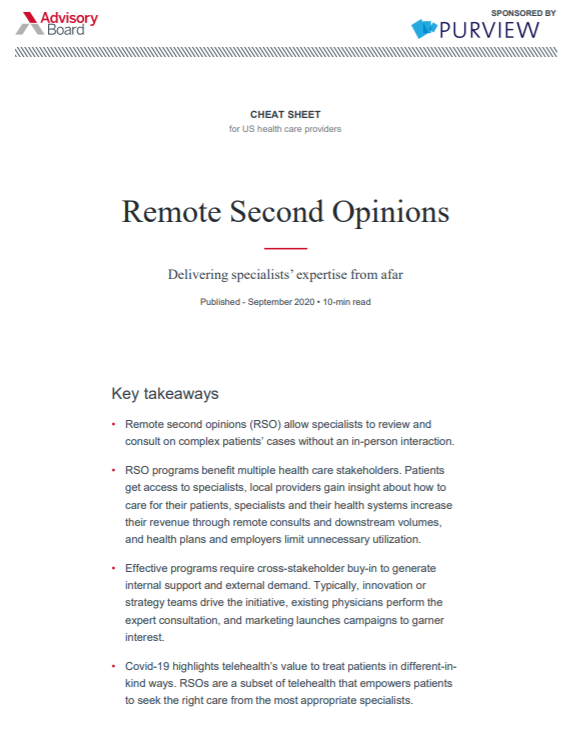Auto logout in seconds.
Continue LogoutRemote second opinions (RSOs) enable specialists to review and consult on patient cases from afar—a technology that's perhaps more important than ever amid the Covid-19 pandemic, when both patients and providers rely heavily on telehealth.
But if you're looking to invest in RSOs, it can be difficult to know where to start. There's one specialty, however, that is particularly ripe for RSO investment: cancer care. Here are the top four reasons why organizations should invest in RSO for their cancer care services—both from a patient and provider perspective:
1. There is a limited supply of cancer subspecialists, especially in rural areas
There are 30 specialists per 100,000 people in rural America, compared with 263 in urban areas. The disparity is even greater in oncology where only 7% of all oncologists practice in rural areas. So, although patients in both rural and urban areas can benefit from an RSO, it's likely more patients in remote areas—where accessing an in-person second opinion for oncology subspecialties can be challenging—would opt for one. Given the expected 40% increase in demand for oncology services by 2025, RSO services will become even more important for patients to access specialist care no matter where they live.
2. Cancer patients want access to subspecialist expertise
In our 2019 Cancer Patient Experience Survey, 52% of respondents ranked "doctor who specializes in my particular cancer" as the most important factor in choosing where to go for care. For these patients, RSOs can be an important differentiating factor when choosing a care plan, because they want top-notch quality above all else. With RSOs, cancer patients access accurate diagnoses, treatments, and endorsements from physicians they trust – and which they otherwise may not be able to access through your organization.
3. Cancer care providers navigate increasingly complex therapeutic choices
It’s more challenging than ever for providers to make proper care decisions given the rise of complex and expensive cancer treatment options, such as gene therapy and immunotherapies. And RSOs can help here as well; in fact, some data suggests that RSOs can result in changes in more than 80% of initial diagnoses.
For smaller community practices in particular, RSOs can facilitate physician-to-physician consults that ensure they have the insight on how best to care for their patients if they don't have the in-house expertise. As for AMCs and other organizations with subspecialists, RSOs offer a new revenue stream and the potential to extend their brand.
4. Covid-19 has increased demand for remote consultations
The Covid-19 crisis is reshaping patient decisions to avoid in-person care where at all possible, especially for those in a high-risk patient population. For instance, cancer patients will likely find RSO technology particularly appealing, since it limits the number of times they need to go to a health care facility. Remote consults and telehealth can be a helpful, safe solution to provide care for cancer patients during the pandemic—and will be a lasting and essential part of caregiving moving forward.
So, what next? Providers interested in investing in RSOs, especially within oncology, should determine what their current mechanisms are for addressing complex care options. Start a dialogue with specialists about RSOs to understand what resources you need to support an RSO program. Lastly, consider any potential hurdles such as reimbursement plans or required operational challenges due to Covid-19. The healthcare landscape will look different than before, and RSOs could the perfect strategy for delivering solutions and supporting patient needs.
Learn more: Remote Second Opinions 101
Second opinions can be valuable to clinicians and patients looking for diagnosis confirmation or weighing treatment options. But in-person access to specialists and expert consultations is limited and often inconvenient, especially outside of major metropolitan areas. In these unprecedented times, when patients are reluctant to seek in-person care, remote access to specialist expertise is more important than ever.
In this cheat sheet, we review RSOs, why they matter, how they work, present barriers to success, and conversations that you should be having before implementing an RSO solution.
Purview is the leader in medical remote and second opinion software serving hospitals and subspecialists around the globe. Their SaaS software is used by innovative healthcare organizations to efficiently gather and coordinate a complete set of a patient’s relevant clinical information, scans and pathology images either in advance of an in-person visit or if more appropriate due to the patient’s circumstances or preference, in lieu of a personal visit. Their mission is to improve medical outcomes by making this information available wherever and whenever it is required for patient treatment or to inform diagnosis.
This blog post is sponsored by Purview, an Advisory Board member organization. Representatives of Purview helped select the topics and issues addressed. Advisory Board experts wrote the post, maintained final editorial approval, and conducted the underlying research independently and objectively. Advisory Board does not endorse any company, organization, product or brand mentioned herein.

Don't miss out on the latest Advisory Board insights
Create your free account to access 1 resource, including the latest research and webinars.
Want access without creating an account?
You have 1 free members-only resource remaining this month.
1 free members-only resources remaining
1 free members-only resources remaining
You've reached your limit of free insights
Become a member to access all of Advisory Board's resources, events, and experts
Never miss out on the latest innovative health care content tailored to you.
Benefits include:
You've reached your limit of free insights
Become a member to access all of Advisory Board's resources, events, and experts
Never miss out on the latest innovative health care content tailored to you.
Benefits include:
This content is available through your Curated Research partnership with Advisory Board. Click on ‘view this resource’ to read the full piece
Email ask@advisory.com to learn more
Click on ‘Become a Member’ to learn about the benefits of a Full-Access partnership with Advisory Board
Never miss out on the latest innovative health care content tailored to you.
Benefits Include:
This is for members only. Learn more.
Click on ‘Become a Member’ to learn about the benefits of a Full-Access partnership with Advisory Board
Never miss out on the latest innovative health care content tailored to you.


